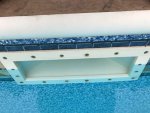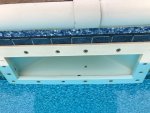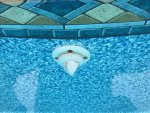I have taken care of my pool according to the tfp method for years now and noticed more or less this year rust around the screw holes that are under water. The screws aren't rusted after pulling a couple out but just some bleed over rust stain. the threads are clean. I keep ph at 7.3-7.7 for the most part and alkalinity between 70-80. I use liquid shock to chlorinate. I don't run water through the heater until it is well balanced in the spring. I am thinking it is water chemistry but can't figure out what it could be except copper in the water? Note: I do have an iron issue although not terribly bad I will deal with soon using AA and a sequestering agent.
PVC around the screws have rust bit not the screws
- Thread starter gdinda
- Start date
You are using an out of date browser. It may not display this or other websites correctly.
You should upgrade or use an alternative browser.
You should upgrade or use an alternative browser.
Please upload pictures of the screws. Are they are the light niche, skimmers, or return jets? Could be a classic case of Galvanic Corrosion.
I can’t because its dark here now but it is at least the skimmers(2) and return jets(2). Seems like the first I saw was this year but who knows if last year too. I did see some small rust stains in one corner of the pool also this year after opening. Thanks for the response.
Are the walls galvanized steel or composite?
Try a magnet to find out. Just get a good magnet and make sure that it's smooth and put it on the wall against the liner to see if it sticks.
Try a magnet to find out. Just get a good magnet and make sure that it's smooth and put it on the wall against the liner to see if it sticks.
Hmmm...I have the same exact thing this year that OP describes. I've tried using a magic eraser to scrub the rust colored marks off, but they seem to be permanent. They only occur near the screws, but the screws themselves do not appear to be rusted. The marks do not appear at every screw. I have no metals in my water as far as I know.
This is my5th 6th (!) year of pool ownership and have maintained the pool exactly the same way (TFB method) each year. This is my 2nd year on a new liner and I refilled with brand new water. Never had any marks last year. I do believe I have galvanized steel walls. If OP can't post a picture, I may try tomorrow night.
This is my
The screws go through the steel walls. So, you can get some bleed-through.
If the walls are steel, a magnet will stick.
If the walls are steel, a magnet will stick.
Please read through the post below. The screws, only at the light niche caused bleeding on the heads and slightly on some of the threads. The liner had some stains, but I was diligent about removing it quickly with vitamin c tabs. The white round housing (where the screws go) inside was all stained and beyond cleaning up and had to be replaced. Only after adding the Zinc Anode (one week later) did the rust stop, and has not surfaced since. The water is so clear that you can always see any defect in the liner.
I am not stating that this is your answer, but if you have this all the way around the pool, it could be galvanic corrosion or just weak stainless steel screws (IDK). Good luck and keep us posted and please upload some pictures.
Zinc Anode
Sequence of chemicals and possibly any effects on what happened to screws at light.
I am not stating that this is your answer, but if you have this all the way around the pool, it could be galvanic corrosion or just weak stainless steel screws (IDK). Good luck and keep us posted and please upload some pictures.
Zinc Anode
Sequence of chemicals and possibly any effects on what happened to screws at light.
Ok, I have the condition on both skimmers and the return in the shallow end. The return in the deep end and the light ring are clean. The entire screw is cleane except for maybe surface staining where this is happening on a couple. I will try to post a pictures now.


The light is of course in the deep end and they are galvanized steel walls I assume and kind of remember when they were building it. But they are definitely steel.



The light is of course in the deep end and they are galvanized steel walls I assume and kind of remember when they were building it. But they are definitely steel.
I see you have the Fusion returns (excellent). Even the circulators work great. This is exactly how the rusting occurred on and there was some dripping on the head. Read my thread and you will see a picture of the screw. The Zinc Anode at the pump solved the problem (you may want to try this). But, you will need to replace all the screws with quality stainless (assuming from Hayward) and remove the faceplates and clean them well. Then put them back with the new screws. I can not guarantee that the anode will work, but it clearly worked for my situation and to this date the screws are still very shiny (underwater).
Mine appeared just after one year without any concerns. The anode should protect you. Again, for $40, it is worth a shot. You can try cleaning the screws, but I would get new ones. You have the same pattern as my liner, but different border.
Mine appeared just after one year without any concerns. The anode should protect you. Again, for $40, it is worth a shot. You can try cleaning the screws, but I would get new ones. You have the same pattern as my liner, but different border.
Thanks for the info. Not totally sold on that but if there were no other explanation who knows. Could it be more metals in the water besides the one I know about(iron) like maybe copper? It is only in the countersunk part exposed to water. Could it be where I add muriatic acid athough I don’t think so because it’s not rusting the screws and it isn’t all screws underwater. Just not sure. Maybe I will clean the pvc upand replace some screws and see what happens before going to the anode. Will the anode limit the metals in the water?
Likely one of three things:
Crappy stainless that really isn't. Not at all uncommon.
Galvanic corrosion due to the metal the screws are connected to.
Galvanic corrosion due to electrical current flowing in the pool.
My money is on the first. The third would probably be more aggressive.
Cleaning the stains may be as simple as rubbing a vitamin C tablet on them.
Crappy stainless that really isn't. Not at all uncommon.
Galvanic corrosion due to the metal the screws are connected to.
Galvanic corrosion due to electrical current flowing in the pool.
My money is on the first. The third would probably be more aggressive.
Cleaning the stains may be as simple as rubbing a vitamin C tablet on them.
I suspect that some of the rust is coming from the metal wall.
The hole should be sealed by the liner, but you can get some bleed through if it's not a good seal.
The hole should be sealed by the liner, but you can get some bleed through if it's not a good seal.
Test for metals, but the staining would be evident in the pool as well, not only near the screws.
I do have an iron issue I will deal with soon. Could that cause this? I did notice a very small amount on the higher screw holes out of the water too. Of course I get nervous about the steel walls and pool heater thinking it has to do with that.
If it were just from the iron in the water, the iron would be more evenly distributed.
All water has some iron. So, you're going to have some general iron stains.
However, the fact that the stains are concentrated at the screw holes but the screws are not rusty points to bleed through of rust at the wall.
Changing Gasket Around Skimmer
All water has some iron. So, you're going to have some general iron stains.
However, the fact that the stains are concentrated at the screw holes but the screws are not rusty points to bleed through of rust at the wall.
Changing Gasket Around Skimmer
I will go to the shop that put it in 7 years ago. If there is some rust but not scaled let’s say on the edges. I don’t know. Hoping I guess. Could it be treated and covered? Thanks for the info and link.
I will go to the shop that put it in 7 years ago. If there is some rust but not scaled let’s say on the edges. I don’t know. Hoping I guess. Could it be treated and covered? Thanks for the info and link.
There are faceplate covers for both returns & skimmers.
Looking at your equipment signature, I’m thinking the builder is in Burlington?
Thread Status
Hello , This thread has been inactive for over 60 days. New postings here are unlikely to be seen or responded to by other members. For better visibility, consider Starting A New Thread.

